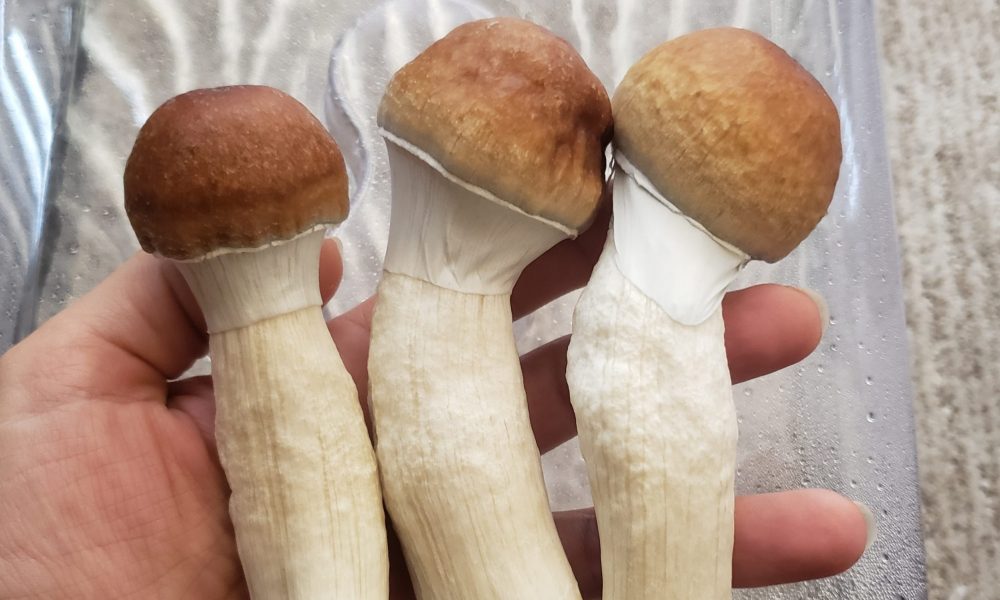Psilocybin use is associated with “persisting reductions” in depression, anxiety, alcohol misuse—as well as increases in emotional regulation, spiritual wellbeing and extraversion—according to a new study.
Researchers at Johns Hopkins University, Ohio State University and Unlimited Sciences said their work represents the “largest prospective survey of naturalistic psilocybin use to date,” finding evidence that supports the “potential for psilocybin to produce lasting improvements in mental health symptoms and general wellbeing.”
For the study, published in the journal Frontiers in Psychiatry on Tuesday, the researchers recruited 2,833 adults and administered multiple surveys before and after they used the psychedelic outside of the clinical setting.
The surveys asked for demographic information, methods of consumption, dosing, setting and intentions of use and subjective changes in mental health. They were administered in phases between July 2020 and July 2022: at the time of consent for the survey, two weeks prior to psilocybin use, one-three days before use, two-four weeks after and two-three months after the experience.
“Prospective longitudinal data collected before and after a planned psilocybin experience on average showed persisting reductions in anxiety, depression, and alcohol misuse, increased cognitive flexibility, emotion regulation, spiritual wellbeing, and extraversion, and reduced neuroticism and burnout after psilocybin use,” the authors said.
The most common reason that people said they took psilocybin was for “self-exploration” (81 percent), followed by mental health (71 percent), therapy (48 percent), creativity (44 percent), recreation (38 percent), productivity (22 percent) and physical health (14 percent). About three in four respondents said they set an intention before using the psychedelic.
A plurality of the participants said they consumed the psilocybin alone (43 percent), while 26 percent said they used together with friends, 16 percent said they did it with a sober friend trip sitting and about three percent used it with a guide or in a facilitated group setting.
Most people (42 percent) took dried whole mushrooms. Another 19 percent said they used dried ground mushrooms, 16 percent said they steeped it in tea and six percent ate mushroom-infused edibles such as chocolates. The average dose, excluding outliers, was 3.1 grams of psilocybin mushrooms.
About 22 percent of respondents met the criteria for having had a “complete mystical experience,” which was a “significant predictor of changes in multiple longitudinal variables including decreased depression, personal burnout, work burnout, and state anxiety, as well as increased cognitive flexibility and spiritual wellbeing.”
Prior to using psilocybin, 42 percent of participants met criteria for some form of depression. In the sixth and final follow-up survey (which involved fewer people because not everyone completed the full study), just 15 percent met the depression criteria.
About 16 percent of respondents’ alcohol consumption was considered “risky” and six percent met criteria for “probable alcohol dependence” before taking psilocybin. By the sixth survey months after the experience, those percentages decreased to 11 percent and four percent, respectively.
Symptoms of anxiety also dissipated following use of the psychedelic. Pre-psilocybin, 29 percent of the respondents were considered to have “high-risk state anxiety.” That dropped to 15 percent by the last survey.
Participants’ average extraversion “significantly increased” after psilocybin use, and neuroticism “significantly decreased,” the study says.
Notably, the researchers found that neither “history of previous psychedelic use nor presence of a sitter/guide were significant predictors of outcomes in any of the longitudinal models.”
Other “commonly reported behavioral changes after psilocybin use” identified in the last survey include improved relationships with others (50 percent), increased physical activity and exercise (27 percent), improvements in professional work (27 percent) and improved diet and nutrition (24 percent). Also, 94 percent of participants characterized their experience as “beneficial.”
“This study presents the largest prospective, longitudinal dataset on naturalistic psilocybin use published to date,” the authors said. “Overall, data support prior evaluations of psilocybin as reasonably safe and non-toxic compared to other commonly used substances, with the caveat that individuals who experienced particularly difficult reactions or significant adverse events may not have been able or willing to respond to follow-up surveys as described in the study limitations.”
“Longitudinal data indicate that among the convenience sample reported here, naturalistic use of psilocybin mushrooms was associated with significant improvements in mental health, wellbeing, and psychological functioning when controlling for demographic variables, in line with initial hypotheses,” the study concludes. “Persisting reductions in depression, state and trait anxiety, and alcohol misuse were found after psilocybin use, congruent with clinical studies showing similar results.”
The study results “are highly consistent with a growing body of clinical trial, behavioral pharmacology, and epidemiological data on psilocybin,” they said. “Overall, these data provide an important window into the current resurgence of public interest in classic psychedelics and the outcomes of contemporaneous increases in naturalistic psilocybin use.”
The research was published weeks after a separate study from the American Medical Association (AMA) came out showing that people with major depression experienced “clinically significant sustained reduction” in their symptoms after just one dose of psilocybin.
These are just some of the latest examples of research finding potential therapeutic applications of psychedelics as lawmakers and advocates across the country work to enact reform.
For example, a peer-reviewed study published in the journal Nature this month says treatment with MDMA reduced symptoms in patients with moderate to severe PTSD.
Another study published last month found that administering a small dose of MDMA along with psilocybin or LSD appears to reduce feelings of discomfort like guilt and fear that are sometimes side effects of consuming so-called magic mushrooms or LSD alone.
A first-of-its-kind analysis released in June offered novel insights into the mechanisms through which psychedelic-assisted therapy appears to help people struggling with alcoholism.
At the federal level, the National Institute on Drug Abuse (NIDA) recently started soliciting proposals for a series of research initiatives meant to explore how psychedelics could be used to treat drug addiction, with plans to provide $1.5 million in funding to support relevant studies.
House Democrats File Marijuana Legalization And Expungements Bill
Read the full article here

